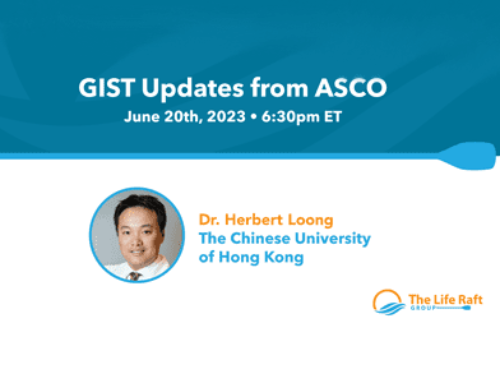Infinity’s IPI-504 completes phase I
HSP90 inhibitor IPI-504 from Infinity has completed phase I testing at five sites in the United States and Canada. HSP-90 is a protein that acts as a chaperone for other proteins during cell stress conditions— a condition often found within inflamed and necrotic tumors. IPI-504 acts by maintaining client protein conformation thereby protecting the client protein from the cell’s natural housekeeping functions. One of the client proteins protected by HSP-90 is mutant c-KIT in GIST. By inhibiting HSP- 90, IPI-504 allows the cell to identify and destroy mutant c-KIT. According to Infinity, the more mutant the client the more effective the HSP-90 inhibition and the greater the opportunity for the cell’s self-cleaning process to work. In theory, IPI-504’s effect is also mutationindependent.
The phase I trial results reported at the 2008 American Society of Clinical Oncology conference involved 45 heavily pre-treated GIST patients. Over 90 percent had failed both Imatinib and Sutent, while 38 percent had three or more GIST treatments and 20 percent had failed nilotinib. A maximum tolerable dose (MTD) was reached at 400 mg/m2 administered as two IV infusions per week for two weeks with one week off-drug in a three week cycle. The top five most common side effects were fatigue, headache, nausea, diarrhea and muscle pain. In a subset of 22 GIST patients who had FDG/PET to measure initial metabolic response at day 11 of the first cycle there were five partial responses and 15 with stable disease for a 90 percent beneficial metabolic response rate. In another subset of 36 GIST patients with CT scans at six weeks, 70 percent had beneficial response by RECIST criteria (3% partial response 67% stable disease). In the RECIST GIST patient subset, progression-free survival was 12 weeks. The partial response was a 70 percent reduction in a patient pretreated with imatinib and sunitinib, both for one year each. In both response subsets GIST patient dosages varied below and up to the MTD. Overall, approximately 58 percent of the 45 GIST patients were at MTD.
There are several notable aspects of this trial. These were heavily pre-treated GIST patients with progressive disease— a difficult test. The most common RECIST response was stability with only one partial response. Progression- free survival was lower than historic norms, three months versus 24 months for Gleevec and six months for Sutent. In this regard, dosage ranged below the MTD for over 40 percent of GIST patients. So, eventual response rates and survival numbers may improve. Lastly, this class of drugs may work best when paired with other GIST drugs.
Plans are now underway for a Phase III trial accruing 195 patients at 50 sites in the United States and internationally. We shall be reporting on this trial in our next newsletter.



